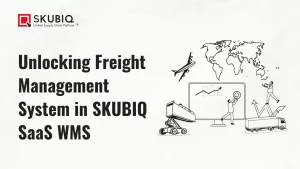In the rapidly evolving landscape of E-commerce, E-commerce inventory management has become a critical factor for success. As businesses scale and customer demands fluctuate, having an efficient and adaptable inventory management system is essential. One solution gaining prominence is the integration of cloud-based technologies into E-commerce warehouses. In this article, we will delve into the advantages and considerations of leveraging cloud-based solutions for inventory management in the E-commerce realm.
The Evolution of Inventory Management Systems
Traditionally, businesses relied on manual methods and on-premises software to handle their inventory. However, the growth of E-commerce has necessitated a more dynamic and scalable approach. This is where warehouse management software and order management system E-commerce come into play. The shift towards digital platforms has led to the development of sophisticated systems that can handle the complexities of modern inventory management.
Cloud-based Solutions: Transforming E-commerce Inventory Management
1. E-commerce Stock Management
One of the primary advantages of cloud-based solutions is the enhancement of E-commerce stock management. Traditional systems often struggle to keep pace with the real-time updates required in the dynamic E-commerce environment. Cloud-based solutions, on the other hand, offer real-time data synchronization, providing accurate insights into inventory levels at any given moment.
2. Real-time Data Warehouse
The concept of a real-time data warehouse is a game-changer for E-commerce businesses. Cloud-based inventory management systems offer a centralized repository of information that is constantly updated. This real-time visibility into stock levels, order statuses, and other critical data enables businesses to make informed decisions swiftly. The days of relying on outdated information are replaced by a proactive approach to managing inventory.
3. E-commerce Warehouse Efficiency
Cloud-based solutions contribute significantly to optimizing ecommerce warehouse operations. The ability to access data from anywhere, at any time, empowers warehouse staff to streamline processes. Automated workflows, powered by cloud-based systems, reduce manual errors and increase the efficiency of order fulfillment. This, in turn, leads to improved customer satisfaction as orders are processed and shipped promptly.
4. Best ERP Software for E-commerce
Enterprise Resource Planning (ERP) software plays a crucial role in integrating various business processes, and E-commerce is no exception. Cloud-based solutions often offer the best ERP software for E-commerce, seamlessly integrating inventory management with other aspects of the business such as finance, sales, and customer relationship management. This integration fosters a cohesive and synchronized approach to business operations.
5. Cost-effective Cloud Solutions
Implementing and maintaining traditional on-premises inventory management systems can incur substantial costs, including hardware, software licenses, and maintenance expenses. Cloud-based solutions, in contrast, operate on a subscription model, eliminating the need for significant upfront investments. This cost-effectiveness makes cloud-based inventory management accessible to businesses of all sizes, leveling the playing field in the competitive E-commerce landscape.
Considerations for Implementing Cloud-based E-commerce Inventory Management
While the benefits are evident, businesses must consider certain factors before transitioning to cloud-based store inventory management systems.
1. Data Security and Compliance
The sensitive nature of inventory and customer data requires robust security measures. When opting for a cloud-based solution, businesses must ensure that the chosen platform adheres to industry-standard security protocols and compliance requirements. Encryption, authentication, and secure access controls are fundamental aspects that should not be compromised.
2. Scalability
E-commerce businesses often experience fluctuations in demand, especially during peak seasons. The scalability of a cloud-based inventory management system is paramount to accommodate sudden increases in data volume and user activity. A system that can seamlessly scale with the business ensures uninterrupted operations and sustained performance.
3. Integration Capabilities
Compatibility with existing systems and the ease of integration are critical considerations. Businesses may already have established workflows and software applications in place. A cloud-based solution should offer smooth integration with these systems to avoid disruptions and ensure a cohesive operational environment.
4. User Training and Adoption
Transitioning to a cloud-based E-commerce inventory management system may require staff training to ensure optimal utilization of the new technology. The ease of use and accessibility of training resources provided by the solution are vital factors that contribute to a successful implementation.
5. Downtime Mitigation Strategies
In the event of unforeseen issues or maintenance requirements, businesses need to have effective downtime mitigation strategies in place. Cloud-based solutions typically have robust backup and redundancy mechanisms, but businesses need to understand and plan for potential downtimes to minimize disruptions.
Conclusion
In conclusion, the adoption of cloud-based solutions for E-commerce inventory management presents a myriad of advantages for businesses seeking to thrive in the digital age. From real-time data visibility to enhanced warehouse efficiency, the benefits are substantial. However, careful consideration of factors such as data security, scalability, and integration capabilities is essential for a seamless transition.
As technology continues to evolve, cloud-based solutions will likely play an increasingly pivotal role in shaping the future of E-commerce. Businesses that embrace these innovations stand to gain a competitive edge by staying agile, efficient, and responsive to the ever-changing demands of the market. With the right cloud-based inventory management system, E-commerce businesses can build a solid foundation for growth and success in the dynamic and competitive online landscape.



